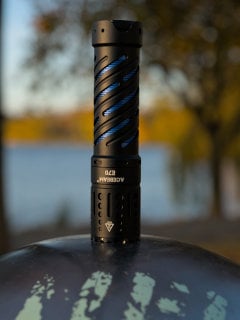The full review is available here
English review at BLF
German review at my website
Summary
Seven LEDs in five colors, in a very compact flashlight. The Nichia 519A LEDs are just beautiful with their high CRI and lovely tint. Red, green and blue are less interesting to me, but the UV light comes in very handy. This paired with the great driver and magnetic charging make the MiX-7 almost perfect.
It’s hard to say anything negative about it. I’d like to see more brightness levels for the color channels and maybe the possibility to mix them. Sometimes it can be annoying that the colors were integrated together with the white channel into the low group.
Overall I’m very satisfied with the MiX-7, even at my high expectations I had for this flashlight. If you want a flashlight with multiple colors, you should definitely try the MiX-7.




it would be way cooler to have a portable full spectrum lamp (like a black body radiation based one), that you can then continuously filter to any wavelength with a dial. Ideally anything between microwaves and x-rays. like with a prism or something.
It would probably have to as large as the most powerful portable LED lamps, so you get a usable brightness out of all frequencies and still be dim lol.
Perhaps you could use tunable lasers, but as I understand it, they aren’t that versatile yet.
biologists and geologists would love it
Tunable lasers dont have that large of a spectrum and they are expensive as fuck. The other thing described is a black body radiator which is a scifi thing currently. I am thinking about making an rgb laser pointer but thats a completely different thing. Still hard to align the lasers tho.
normal incandescent bulbs, arclamps and and gas mantle lamps primarily work trhough black body radiation and have a similar spectrum to the sun. especially if you don’t filter out UV.
I didnt know about the others but incandescent doesnt work because the glass blocks most of the waves if i remember correctly.
Put your hand in front of a 120 W bulb. Does it get warm?
Question is: What do you want to achieve by using a black body radiator? It won’t give you any fancy colors, just a pretty smooth spectrum.
Thats infrared. You dont get a sunburn for example because the glass blocks the uv out. Thats why you dont get a sunburn indoors.
So you can have a light with a continuously variable wavelength. E.g. to see how organisms/minerals react to any wavelength through photoluminescence.
Basically just academic interest or just for fun.
Yeah I think some of the small amount of UV is intentionally filtered out by the glass. You’d have to use a glass that is optically clear to all wavelengths. Probably not possible, but I know you can get glass transparent to UV light.


